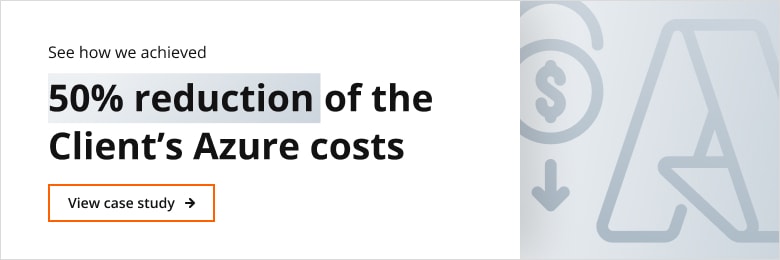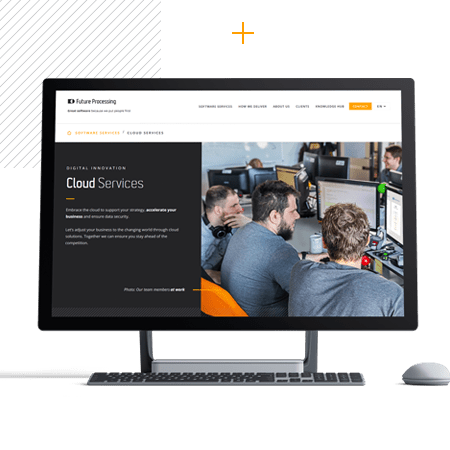
What to consider when choosing a Cloud Provider for your business?
The cloud migration process is a multi-step operation with many factors and cloud services to consider. As more and more IT systems become external, choosing the ideal cloud service provider becomes more important and, due to the wealth of options, more difficult than ever.
How to choose a Cloud Provider?
Choosing the best cloud service provider is a trade-off that takes into account both the benefits offered by solutions available for purchase on the market. How to avoid a digital leap of faith during the process? How to make a good choice?
There are several basic considerations that must be analysed and taken into account when choosing a cloud service provider for a business.
Eleven crucial aspects that every organisation must evaluate to their fullest extent are:
Certifications & Standards
Technologies and Service Roadmap
Data Security
Data Governance and Business Policies
Service Dependencies & Partnerships
Contracts
Commercials and SLAs
Reliability and Performance
Migration Support
Vendor Lock-In and Exit Planning
Business Health & Company Profile
Once all of these are taken into account, there are three cloud service providers that stand out for their ability to provide greatly in all of these categories: AWS, Azure, and Google Cloud.
Why choosing the right Cloud Provider is important?
Choosing the right cloud service provider is crucial for the success, security, and efficiency of your organisation’s cloud strategy. But it’s not an easy process as it all depends on the services the cloud provider offers, its scalability and flexibility, its performance and reliability, its geographical reach and compliance with regulations.
When choosing it, it’s therefore essential to evaluate your specific needs, consider the factors mentioned above, and choose a cloud provider that aligns with your long-term goals.
How to choose between Azure, AWS and Google Cloud?
Choosing between Azure, AWS (Amazon Web Services), and Google Cloud requires a comparison of each cloud service provider: its features, services, pricing, and alignment with your organisation’s needs.
Each of those cloud service providers has its strengths and weaknesses, and the decision should be based on factors such as the types of services you require, your budget, existing technology stack, and long-term strategic goals.
AWS (Amazon Web Services) is known for being popular among startups, enterprises, and businesses requiring a diverse set of tools and services. Azure is a good choice for organisations heavily invested in Microsoft technologies, while Google Cloud’s global network and focus on modern application development make it appealing to organisations seeking innovation and data-driven insights.
Guide for successful cloud adoption
Download our comprehensive ebook for cloud adoption
Here is some more information that will allow you to make a good decision:
Amazon Web Services (AWS)
Amazon Web Services, or AWS, is the first of three leading cloud service providers. As the clear industry leader when it comes to cloud solutions. AWS Cloud Services sets the standard for other top cloud service providers in the form of product offerings, price points, and other essential elements.
AWS offers a broad range of cloud technology and cloud-based products, including storage services, analytics, security application services, cloud infrastructure services, databases, and more.
This wide variety of cloud service offerings enables an even wider use spectrum within business processes. Despite this generalised focus, the AWS cloud management platform provides a suite of integrated tools in a centralised dashboard that businesses can use to monitor and manipulate cloud computing processes and cloud resources.

One of the most prevalent AWS cloud computing service is its cloud object storage or S3. This storage as a service offering allows users to store and access data on the web.
Another popular service is the EC2 (Elastic Compute Cloud), which lets companies rent virtual cloud servers that operate in the cloud. S3 and EC2 are particularly attractive because of their scalability and adaptability, a common theme across AWS products. The pay-as-you-go model of many of Amazon’s products enables smaller businesses to enjoy the segmented benefits of cloud service without the budget of a major firm.
However, AWS also provides benefits to large companies. Its managed services have proven themselves a major point of conversion for large enterprises that want simplified cloud migration processes for easy access to cloud benefits.
With regards to its competitors, AWS has enjoyed much of its success due to its first-mover advantages. Being the first of the cloud computing service providers on the market has led AWS to enjoy a more enterprise-ready system with greater diversity and depth of use.
By offering immediate and drastic cost savings for cloud computing services compared to traditional in-house data centres, many businesses immediately jumped to migrate services to Amazon’s new platform.
As a result of these circumstances, paired with a variety of competitive advantages, Amazon currently controls over a third of the market, which is nearly double that of its closest competitor.
However, despite its significant lead in market share, its two most significant competitors, Microsoft and Google, are quickly making strides in terms of product development and customer acquisition. In particular, mobile applications and edge computing are areas where these companies are beginning to eat into AWS’s market share.
Microsoft Azure
Microsoft Azure is among the top cloud service providers as the second-largest cloud service provider in the world, just behind Amazon Web Services (AWS).
Due to its strong reputation as a large technology company and advanced security, many large businesses and corporations looking for a public cloud provider choose Azure’s cloud platform. According to Microsoft, “95% of Fortune 500 companies trust their businesses on Azure.”
For small to medium-sized businesses, Microsoft Azure services can be problematic or out of reach because they are expensive and may not blend well with a small IT staff. A study by Gartner states, “Azure is neither as feature-rich nor mature as AWS.”
Nonetheless, Azure is a leading cloud company with strengths in on-demand computing, data storage, and data management and lower IT costs.
Microsoft Azure provides over 200 cloud-based services but divides them into 18 categories like computing, networking, storage, IoT, artificial intelligence, machine learning, and more.
The cloud service makes managing these many services easy through a pay-per-use model where a company pays only for services they opt in for. This model is useful for large businesses that heavily consume computing resources because services constantly need to be added or ended. Since Microsoft Azure supports Java, a programming language used primarily by large corporations, it is highly attractive to larger businesses.
Further exploring cloud migration and cloud computing services, Microsoft Azure boasts a strong and cost-effective hybrid and multiple clouds approach. Large businesses can maximise their on-premises investments and assets when migrating to the cloud, removing the need for a major data center.
A popular service includes the Virtual Machine service that enables the creation of new generation virtual machines in Windows, Linux, or other configurations in seconds. A strong virtual machine is necessary to optimise data centres to manage data effectively.
Another popular service is the Microsoft Azure Key Vault, which allows for the secure storage and tight control of confidential data like API keys, passwords, and cryptographic keys. Yet another is the Microsoft Azure Kubernetes Service (AKS) which offers the quickest way to start developing and deploying cloud-native apps with built-in code-to-cloud pipelines and guardrails.
Finally, Microsoft Azure has several competitive advantages over other providers. Azure is compliant with government regulations because it is authorised by FedRAMP, a federal agency that monitors the security of cloud products and services. As stated before, Azure is more cost-effective than Amazon Web Services and offers reduced rates for customers that move to its services.
Lastly, Azure has a strong reputation for its high standard of security for hybrid computing and multi-cloud computing. Overall, Microsoft Azure is quickly becoming popular due to its advantageous costs, federal compliance, and flexible and scalable services.
Google Cloud Platform (GCP)
While not as heavily implemented as AWS or Azure, Google Cloud is still the third largest cloud service provider, and one of the top cloud service providers, in the world.
Google provides reliable and highly scalable cloud solutions to its users, allowing for large enterprise workloads to be completed in the cloud infrastructure. These services help clients compute, store data, help developers build, test and deploy apps.
Google Cloud’s various cloud services cover application, storage, and cloud computing services for backend, mobile, and web solutions using the Internet.
One advantage that the Google Cloud platform lends to its customers is that it uses a simple file system. This system is the foundation of Google Cloud Services, handling requests for information via basic commands like write, read and open.
Due to its ease of use, many small and large enterprises are increasingly adopting the Google Cloud Platform due to its ability to more securely handle IT services for its customers without the need for complicated data migration techniques.
The products offered by Google Cloud Platform are categorised into four categories: Compute, Storage, Big Data, and Services.
The Compute Engine of the Google Cloud Platform falls under the Compute category. As a part of Google Cloud, the Compute Engine allows customers to build virtual machines and run them on Google infrastructure, making it more secure.
Cloud Storage, under the Storage category, allows for durable object and database storage in an efficient manner, allowing data management to occur without the need for a physical server in a data center.
BigQuery, in the Big Data category, serves as data storage in a cloud platform for business insights, allowing for emerging technologies such as Artificial Intelligence and Machine Learning solutions to be implemented in a business following data analytics.
Translate and Prediction API allows for Apigee API Management which allows consumers to successfully utilise hybrid cloud technologies fully within their business operations.
As a cheaper alternative compared to its competitors, Google Cloud offers several competitive advantages.
First and foremost, Google Cloud provides live migration in a private cloud environment, which allows customers to be unbothered by maintenance by Google since their virtual machines and services are protected from interruption, rebooting, or modification. This separates it from other competitors below it in terms of market share, like IBM Cloud, Oracle Cloud, Alibaba Cloud, Adobe Creative Cloud, etc.
Second, the Google App Engine provides minimal overheads, allowing for greater economies of scale that allow customers to save more and spend less to utilise the hybrid cloud services provided.
Overall, the Google Cloud Platform is quickly becoming popular due to its cheaper costs, wide variety of cloud services provided, and lack of interruption or modification of workloads.
Still hesitating which Cloud Service Provider is the best solution for you?
All three cloud platforms are highly respected and can provide quality solutions for a business, but there are hundreds of other solutions available. These three are all highly reliable for businesses, large and small, and making the switch to their cloud computing services now would allow any business to reach new heights of success.
The challenge for companies is to decide when is the right time to adopt cloud strategy for their business and to achieve both ongoing operational and long-term strategic goals.
To choose well, get in touch with our team. At Future Processing we help diverse companies to decide on the best options for them.
What’s more, we also help you on every stage of their cloud computing journey by seamlessly conducting their migration to whichever cloud service provider you choose.





